25 oct 2018
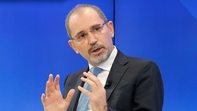
Jordan's Foreign Minister Ayman Safadi
Jordanian Foreign Minister Ayman Safadi insists Amman has 'acted within the provisions of the peace treaty' in deciding not to extend Israel's lease on lands in Naharayim and Tzofar, noting 'There has never been a question of our solid commitment to the peace treaty.'
AMMAN - Jordan said on Thursday its commitment to uphold a peace treaty with Israel was not in question despite ending a 25-year special regime that allows its neighbor to use two parcels of land along its borders under its sovereignty.
Jordan formally notified Israel on Sunday it would not renew the deal over Baquora (the Island of Peace in Naharayim) where the Yarmouk River flows into the Jordan River and in the Ghumar area (the Tzofar enclave) in the southern Arava desert, where Israeli farmers have large plantations.
King Abdullah, who stressed the territories were Jordanian lands and would remain so, said the move was made in the "national interest" at a period of regional turmoil.
Under the peace treaty, the two areas were recognized to be under Jordanian sovereignty but gave Israel special provisions to use the land and allow Israelis free access, while in the Naharayim area Israeli private property rights were respected.
Foreign Minister Ayman Safadi said the deal, which was signed in November 1994, had been conceived as a temporary arrangement from the start.
"That is why there was a time cap on it ... We acted within the provisions of the peace treaty. This is an indication of our commitment to the peace treaty.
There has never been a question of our solid commitment to the treaty," Safadi told Reuters.
Jordan is one of only two Arab states that has a peace treaty with Israel, and the two countries have a long history of close security ties. But the treaty is unpopular and pro-Palestinian sentiment is widespread in Jordan.
Safadi said the kingdom had contemplated the move for a while before the November 10 deadline.
Under the peace treaty, the deal would be automatically renewed unless either of the parties notified the other a year before expiry that it wished to terminate the agreement.
Prime Minister Benjamin Netanyahu acknowledged Jordan's move and said his country sought to enter negotiations on the possibility of extending the arrangement.
The kingdom was now awaiting Israel invoking a provision in the treaty to hold consultations after giving notice before the deadline, Safadi said.
"There will be no negotiations over sovereignty. But we will fulfil our obligation to engage in consultations to implement the termination," Safadi added.
The monarch's move was hailed by parliamentarians who have been vocal against a renewal they say was humiliating and perpetuates Israeli "occupation" of Jordanian territory.
Safadi said Jordan would respect its obligations towards Israelis in the peace treaty that demarcated borders for the first time since the creation of Israel in 1948.
"We will fulfil our legal commitments in a manner that recognizes whatever rights there are for Israel, particularly the property rights. We will respect these rights in accordance with Jordanian laws that respects private property of non-Jordanians," Safadi added.
Jordanian Foreign Minister Ayman Safadi insists Amman has 'acted within the provisions of the peace treaty' in deciding not to extend Israel's lease on lands in Naharayim and Tzofar, noting 'There has never been a question of our solid commitment to the peace treaty.'
AMMAN - Jordan said on Thursday its commitment to uphold a peace treaty with Israel was not in question despite ending a 25-year special regime that allows its neighbor to use two parcels of land along its borders under its sovereignty.
Jordan formally notified Israel on Sunday it would not renew the deal over Baquora (the Island of Peace in Naharayim) where the Yarmouk River flows into the Jordan River and in the Ghumar area (the Tzofar enclave) in the southern Arava desert, where Israeli farmers have large plantations.
King Abdullah, who stressed the territories were Jordanian lands and would remain so, said the move was made in the "national interest" at a period of regional turmoil.
Under the peace treaty, the two areas were recognized to be under Jordanian sovereignty but gave Israel special provisions to use the land and allow Israelis free access, while in the Naharayim area Israeli private property rights were respected.
Foreign Minister Ayman Safadi said the deal, which was signed in November 1994, had been conceived as a temporary arrangement from the start.
"That is why there was a time cap on it ... We acted within the provisions of the peace treaty. This is an indication of our commitment to the peace treaty.
There has never been a question of our solid commitment to the treaty," Safadi told Reuters.
Jordan is one of only two Arab states that has a peace treaty with Israel, and the two countries have a long history of close security ties. But the treaty is unpopular and pro-Palestinian sentiment is widespread in Jordan.
Safadi said the kingdom had contemplated the move for a while before the November 10 deadline.
Under the peace treaty, the deal would be automatically renewed unless either of the parties notified the other a year before expiry that it wished to terminate the agreement.
Prime Minister Benjamin Netanyahu acknowledged Jordan's move and said his country sought to enter negotiations on the possibility of extending the arrangement.
The kingdom was now awaiting Israel invoking a provision in the treaty to hold consultations after giving notice before the deadline, Safadi said.
"There will be no negotiations over sovereignty. But we will fulfil our obligation to engage in consultations to implement the termination," Safadi added.
The monarch's move was hailed by parliamentarians who have been vocal against a renewal they say was humiliating and perpetuates Israeli "occupation" of Jordanian territory.
Safadi said Jordan would respect its obligations towards Israelis in the peace treaty that demarcated borders for the first time since the creation of Israel in 1948.
"We will fulfil our legal commitments in a manner that recognizes whatever rights there are for Israel, particularly the property rights. We will respect these rights in accordance with Jordanian laws that respects private property of non-Jordanians," Safadi added.
22 oct 2018
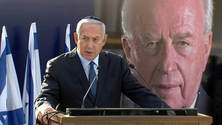
Following Jordanian King Abdullah's decision to exercise option of ending Israel's lease on two territories, which was done under peace treaty, Prime Minister Netanyahu promises to negotiate extending the agreement.
Prime Minister Benjamin Netanyahu said Sunday that Israel will renegotiate two annexes to its peace treaty with Jordan in an effort to maintain control over Naharayim and Tzofar, after the Hashemite Kingdom decided to reclaim the territories.
Under the accord, Israel has been leasing the Island of Peace in Naharayim and the Tzofar enclave in the Arava for nearly a quarter of a century.
Israeli farmers have cultivated the land for many years, but the terms of the agreement state that 25 years after the initial signing, each party will be able to discontinue the lease of the land on one condition—it should be done one year in advance, and this Sunday marks 24 years since the treaty was signed.
"Jordan has reserved the option to reclaim the area in Naharayim near the Jordan River and the Tzofar enclave in the Arava. We were told today that it seeks to exercise this option in the 25th year," the prime minister said. "We will go into negotiations with them on the option of extending the existing agreement."
Nevertheless, Netanyahu stressed, "There's no doubt that in a general outlook, the entire treaty is a valuable asset, important to both countries."
The peace treaty with Jordan, alongside the one signed by Prime Minister Menachem Begin with Egypt, "are main anchors of regional stability," the prime minister added.
"In addition, we're expanding ties with other Arab countries for whom the State of Israel is not the enemy," he concluded.
Jordan's King Abdullah, who has been facing pressure for some time to cancel the agreement with Israel, announced the decision to reclaim the territories on Sunday.
"We are practicing our full sovereignty on our land," Abdullah said. "Our priority in these regional circumstances is to protect our interests and do whatever is required for Jordan and the Jordanians."
Central Arava Regional Council head Eyal Bloom expressed concern by the Jordanian decision, saying "the agricultural lands in the Tzofar enclave are significant to the security of the area, the state, the livelihood of the residents and agriculture in the central Arava. This would mean the collapse of 30 farms in an area of some 1,400 dunams (346 acres)."
"It is unacceptable that after so many years, there would be such a huge disruptive change," Bloom added.
He called on Prime Minister Benjamin Netanyahu to resolve the crisis, saying the lands in question don't only serve for agriculture, but also "constitute a barrier between the populated areas of the Arava and Jordan, and they are critical, because of their location, to the security of the region and the state."
Prime Minister Benjamin Netanyahu said Sunday that Israel will renegotiate two annexes to its peace treaty with Jordan in an effort to maintain control over Naharayim and Tzofar, after the Hashemite Kingdom decided to reclaim the territories.
Under the accord, Israel has been leasing the Island of Peace in Naharayim and the Tzofar enclave in the Arava for nearly a quarter of a century.
Israeli farmers have cultivated the land for many years, but the terms of the agreement state that 25 years after the initial signing, each party will be able to discontinue the lease of the land on one condition—it should be done one year in advance, and this Sunday marks 24 years since the treaty was signed.
"Jordan has reserved the option to reclaim the area in Naharayim near the Jordan River and the Tzofar enclave in the Arava. We were told today that it seeks to exercise this option in the 25th year," the prime minister said. "We will go into negotiations with them on the option of extending the existing agreement."
Nevertheless, Netanyahu stressed, "There's no doubt that in a general outlook, the entire treaty is a valuable asset, important to both countries."
The peace treaty with Jordan, alongside the one signed by Prime Minister Menachem Begin with Egypt, "are main anchors of regional stability," the prime minister added.
"In addition, we're expanding ties with other Arab countries for whom the State of Israel is not the enemy," he concluded.
Jordan's King Abdullah, who has been facing pressure for some time to cancel the agreement with Israel, announced the decision to reclaim the territories on Sunday.
"We are practicing our full sovereignty on our land," Abdullah said. "Our priority in these regional circumstances is to protect our interests and do whatever is required for Jordan and the Jordanians."
Central Arava Regional Council head Eyal Bloom expressed concern by the Jordanian decision, saying "the agricultural lands in the Tzofar enclave are significant to the security of the area, the state, the livelihood of the residents and agriculture in the central Arava. This would mean the collapse of 30 farms in an area of some 1,400 dunams (346 acres)."
"It is unacceptable that after so many years, there would be such a huge disruptive change," Bloom added.
He called on Prime Minister Benjamin Netanyahu to resolve the crisis, saying the lands in question don't only serve for agriculture, but also "constitute a barrier between the populated areas of the Arava and Jordan, and they are critical, because of their location, to the security of the region and the state."
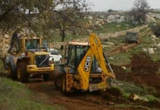
Jordanian King Abdullah II informed Israel, on Sunday, that he will not renew two annexes of the 1994 peace treaty between Israel and Jordan, with regard to territory leased to Israel.
The territories in question are al-Baqura and al-Ghamr, which are also known as Naharyaim and Zofar in the Hebrew language.
King Abdullah II posted a tweet on his Twitter account, which read “Baqura and Ghamr areas have always been our top priority and our decision is to end Article 2 of Annexes I (b) of the Jordan-Israel Peace Treaty emanating from our keenness to take whatever is necessary for Jordan and Jordanians.”
Israel leased the land for 25 years upon the signing of the peace treaty, and the deadline for renewing leases of the treaty is this upcoming Thursday, according to Ma’an.
Due to the deadline for renewal approaching, King Abdullah II has faced ongoing pressure from the Jordanian parliament not to renew the leases and to return the territory to full Jordanian sovereignty.
It is noteworthy that 87 lawmakers have also signed a petition regarding the issue.
Last week, mass demonstrations took place in Amman, as well as social media campaigns demanding that Jordan reclaim sovereignty over Baqura and Ghamr, with slogans such as “The people want national honor” and “The story is about national sovereignty.”
Several demonstrators also demanded Jordan to cancel the entire peace treaty with Israel.
The territories in question are al-Baqura and al-Ghamr, which are also known as Naharyaim and Zofar in the Hebrew language.
King Abdullah II posted a tweet on his Twitter account, which read “Baqura and Ghamr areas have always been our top priority and our decision is to end Article 2 of Annexes I (b) of the Jordan-Israel Peace Treaty emanating from our keenness to take whatever is necessary for Jordan and Jordanians.”
Israel leased the land for 25 years upon the signing of the peace treaty, and the deadline for renewing leases of the treaty is this upcoming Thursday, according to Ma’an.
Due to the deadline for renewal approaching, King Abdullah II has faced ongoing pressure from the Jordanian parliament not to renew the leases and to return the territory to full Jordanian sovereignty.
It is noteworthy that 87 lawmakers have also signed a petition regarding the issue.
Last week, mass demonstrations took place in Amman, as well as social media campaigns demanding that Jordan reclaim sovereignty over Baqura and Ghamr, with slogans such as “The people want national honor” and “The story is about national sovereignty.”
Several demonstrators also demanded Jordan to cancel the entire peace treaty with Israel.
3 oct 2018

Israeli authorities have denied entry, into the West Bank, to more than half of the participants in an exhibition for Jordanian industries, a Jordanian official said on Wednesday.
Deputy Chairman of Amman Chamber of Commerce Adnan Ghaith said that 120 Jordanians who have registered to participate in the trade fair that opened on Tuesday, at the Convention Palace in Bethlehem, were denied entry, by Israel, to the occupied West Bank
Highlighting the glaring absence of attendees, Ghaith added that only 80 out of 200 Jordanian participants were allowed entry to participate in the 4th Jordanian Industries and Products Exhibition.
He slammed Israeli restrictions on guests’ entry to the occupied Palestinian territories as part of Israeli policies aimed at the disruption of such exhibitions aimed to promote Palestinian-Jordanian trade cooperation and exchange.
“Despite Israeli authorities’ efforts to impede the trade fair, our message is clear: We are determined to organize the exhibition in Palestine no matter what difficulties it faces,” said Ghaith, who is also chairman of the Jordanian committee that organizes industrial trade fairs.
This year’s edition of the three-day fair is designed to increase the annual share of Jordanian industries in the Palestinian market to $500 million, according to WAFA.
Deputy Chairman of Amman Chamber of Commerce Adnan Ghaith said that 120 Jordanians who have registered to participate in the trade fair that opened on Tuesday, at the Convention Palace in Bethlehem, were denied entry, by Israel, to the occupied West Bank
Highlighting the glaring absence of attendees, Ghaith added that only 80 out of 200 Jordanian participants were allowed entry to participate in the 4th Jordanian Industries and Products Exhibition.
He slammed Israeli restrictions on guests’ entry to the occupied Palestinian territories as part of Israeli policies aimed at the disruption of such exhibitions aimed to promote Palestinian-Jordanian trade cooperation and exchange.
“Despite Israeli authorities’ efforts to impede the trade fair, our message is clear: We are determined to organize the exhibition in Palestine no matter what difficulties it faces,” said Ghaith, who is also chairman of the Jordanian committee that organizes industrial trade fairs.
This year’s edition of the three-day fair is designed to increase the annual share of Jordanian industries in the Palestinian market to $500 million, according to WAFA.
26 sept 2018
|
|
During his speech from the podium of the General Assembly of the United Nations, in New York, King Abdullah of Jordan, said that only the two-state solution, and the full implementation of all resolutions issued by the United Nations and the Security Council, can resolve the current conflict, and bring peace to Israel and Palestine.
King Abdullah stressed on the importance of establishing a viable, sovereign and independent Palestinian State, with east Jerusalem as its capital, living in peace next to Israel and the rest of the world. He added that all resolutions, adopted by the United Nations and its Security Council since the beginning of the conflict, fully recognize the legitimate Palestinian rights of independence and liberty, to live in peace and dignity. |
“This is the core of the two-state solution,” he said, “This is the only way to achieve a lasting, comprehensive peace.”
He also stated that all Arab and Islamic States are committed to a comprehensive peace, and the Arab Peace Initiative, which was submitted more than 16 years ago, offering peace and normalization with Israel in return for its complete withdrawal from the occupied Palestinian territories, including East Jerusalem.
King Abdullah added that various countries around the world, the United Nations and the European Union, have been working to achieve real peace and security.
“We cannot just surrender because the mission is hard. Otherwise, what are the alternatives we will all face? We cannot keep one of the most important, strategic, regions in the entire word hostage for endless violence,” he said, “Jerusalem, a holy city to more than half of the people of this world, cannot continue to face these constant threats that target its heritage, history and its identity based on respect to all religions.”
“What is the future that we will face based on what some are suggesting? A bi-national state based on denying equality among its citizens? This is the ugly and undemocratic truth about the one-state solution, which is not, in any way, an alternative to peace based on the two-state solution.” King Abdullah added, “It is just another way to avoid working towards a peaceful settlement, based on equal rights for all.”
King Abdullah also said that world countries must work together to restart the peace process on the correct track, away from threats, illegal activities, the confiscation of lands, or threats targeting the daily livelihood and security of innocent civilians, especially the children.
He also called for supporting and financing the United Nations Relief and Works Agency (UNRWA), and all organizations that support the poor families and the stability of societies.
Further, the Jordanian King stressed on the importance of protecting and preserving the heritage of Jerusalem, a city holy to billions around the world, and added that any attempt to alter and void the historic, Arab, Islamic and Christian history of the city, must be encountered and foiled.
In related news, Nabil Abu Rodeina, the spokesperson of the Palestinian President Mahmoud Abbas, strongly denounced Trump’s speech at the opening session of the United Nations General Assembly, and said the Trump is only deepening conflict, and obstructing the chances of achieving real peace.
Abu Rodeina said that Jerusalem is and will remain the capital of Palestine in the 1967 borders, regardless of who accepts or rejects this fact.
Dr. Hanan Ashrawi, a member of the Executive Committee of the Palestine Liberation Organization (PLO), said in a tweet that the speech of the U.S. President is “plain bullying.”
“Trump at the UN: superficial defense of unilateralism, isolationism & plain bullying,” she wrote, “He launched an arrogant attack on the global system from its podium, boasted of illegally moving embassy to Jerusalem & leaving HR Council! Condescending ignorance: double flaws.”
He also stated that all Arab and Islamic States are committed to a comprehensive peace, and the Arab Peace Initiative, which was submitted more than 16 years ago, offering peace and normalization with Israel in return for its complete withdrawal from the occupied Palestinian territories, including East Jerusalem.
King Abdullah added that various countries around the world, the United Nations and the European Union, have been working to achieve real peace and security.
“We cannot just surrender because the mission is hard. Otherwise, what are the alternatives we will all face? We cannot keep one of the most important, strategic, regions in the entire word hostage for endless violence,” he said, “Jerusalem, a holy city to more than half of the people of this world, cannot continue to face these constant threats that target its heritage, history and its identity based on respect to all religions.”
“What is the future that we will face based on what some are suggesting? A bi-national state based on denying equality among its citizens? This is the ugly and undemocratic truth about the one-state solution, which is not, in any way, an alternative to peace based on the two-state solution.” King Abdullah added, “It is just another way to avoid working towards a peaceful settlement, based on equal rights for all.”
King Abdullah also said that world countries must work together to restart the peace process on the correct track, away from threats, illegal activities, the confiscation of lands, or threats targeting the daily livelihood and security of innocent civilians, especially the children.
He also called for supporting and financing the United Nations Relief and Works Agency (UNRWA), and all organizations that support the poor families and the stability of societies.
Further, the Jordanian King stressed on the importance of protecting and preserving the heritage of Jerusalem, a city holy to billions around the world, and added that any attempt to alter and void the historic, Arab, Islamic and Christian history of the city, must be encountered and foiled.
In related news, Nabil Abu Rodeina, the spokesperson of the Palestinian President Mahmoud Abbas, strongly denounced Trump’s speech at the opening session of the United Nations General Assembly, and said the Trump is only deepening conflict, and obstructing the chances of achieving real peace.
Abu Rodeina said that Jerusalem is and will remain the capital of Palestine in the 1967 borders, regardless of who accepts or rejects this fact.
Dr. Hanan Ashrawi, a member of the Executive Committee of the Palestine Liberation Organization (PLO), said in a tweet that the speech of the U.S. President is “plain bullying.”
“Trump at the UN: superficial defense of unilateralism, isolationism & plain bullying,” she wrote, “He launched an arrogant attack on the global system from its podium, boasted of illegally moving embassy to Jerusalem & leaving HR Council! Condescending ignorance: double flaws.”
3 sept 2018
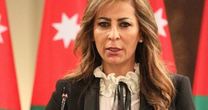
Jordan on Sunday rejected a proposal initiated by US administration officials to establish a Palestinian-Jordanian confederation.
Jordanian government spokeswoman Jumana Ghneimat said that joining the kingdom with the West Bank, the area Palestinians want for a future state within the 1967 borders, is not a matter that is open for discussion.
During a meeting with an Israeli delegation that visited Ramallah on Sunday, Palestinian Authority president Mahmoud Abbas said that senior US administration officials Jared Kushner and Jason Greenblatt asked him recently about his opinion of a "confederation with Jordan".
"I said yes to the offer, but I want a three-way confederation with Jordan and Israel," Abbas said.
Jordanian government spokeswoman Jumana Ghneimat said that joining the kingdom with the West Bank, the area Palestinians want for a future state within the 1967 borders, is not a matter that is open for discussion.
During a meeting with an Israeli delegation that visited Ramallah on Sunday, Palestinian Authority president Mahmoud Abbas said that senior US administration officials Jared Kushner and Jason Greenblatt asked him recently about his opinion of a "confederation with Jordan".
"I said yes to the offer, but I want a three-way confederation with Jordan and Israel," Abbas said.
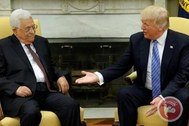
Palestinian President Mahmoud Abbas agreed to a peace plan on Sunday offered by the United States administration on provision that Israel would also be part of the confederation with Jordan.
Abbas said in a statement during a meeting held on Sunday with the left-wing Peace Now movement and Israeli Knesset members, that the United States Trump administration proposed a peace plan that was based on a confederation with Jordan.
However, Abbas told the US administration he would only agree to the proposal on the provision that Israel would also be part of the confederation.
The meeting was attended by the Peace Now Chairwoman, Shaked Morag, and MK’s Mossi Raz of the Meretz party and Ksenia Svetlova for the Zionist Union party.
Abbas informed the attendees that the US peace envoy, Jason Greenblatt, and Trump's senior advisor, Jared Kushner, asked if he believes in a federation with Jordan.
He added that he agreed to the proposal "I want a triangular confederation with Jordan and Israel. I asked if Israel would agree to that proposal."
He stressed that following the US decision to end all funding to the United Nations Relief and Works Agency for Palestine Refugees (UNRWA), the US "is closing the peace process. The US wants to destroy UNRWA completely," noting that 70% of Gaza’s residents are refugees.
"Most of them live on UNRWA’s assistance. Then President Trump says 'cancel UNRWA and give humanitarian aid to Gaza.' How is it possible to abolish UNRWA on the one hand and Palestinians be given humanitarian aid on the other," he asked.
Abbas continued "I have met with Trump four times. Trump said that he supports the two-state solution and that he’s in favor of a demilitarized state with NATO forces maintaining a secure environment in the area."
He confirmed his support for Israel’s security and for finding a solution to the Palestinian refugee problem.
Abbas mentioned that the Israeli Prime Minister Benjamin Netanyahu refuses to meet with him face to face, "My problem is with Netanyahu, not with the Likud. Netanyahu is against Trump’s proposal."
Morag concluded the meeting by assuring Abbas that "The Israeli peace camp is widespread and during the next general election Peace Now will demand from the leaders a commitment to advancing the two-state solution."
Abbas said in a statement during a meeting held on Sunday with the left-wing Peace Now movement and Israeli Knesset members, that the United States Trump administration proposed a peace plan that was based on a confederation with Jordan.
However, Abbas told the US administration he would only agree to the proposal on the provision that Israel would also be part of the confederation.
The meeting was attended by the Peace Now Chairwoman, Shaked Morag, and MK’s Mossi Raz of the Meretz party and Ksenia Svetlova for the Zionist Union party.
Abbas informed the attendees that the US peace envoy, Jason Greenblatt, and Trump's senior advisor, Jared Kushner, asked if he believes in a federation with Jordan.
He added that he agreed to the proposal "I want a triangular confederation with Jordan and Israel. I asked if Israel would agree to that proposal."
He stressed that following the US decision to end all funding to the United Nations Relief and Works Agency for Palestine Refugees (UNRWA), the US "is closing the peace process. The US wants to destroy UNRWA completely," noting that 70% of Gaza’s residents are refugees.
"Most of them live on UNRWA’s assistance. Then President Trump says 'cancel UNRWA and give humanitarian aid to Gaza.' How is it possible to abolish UNRWA on the one hand and Palestinians be given humanitarian aid on the other," he asked.
Abbas continued "I have met with Trump four times. Trump said that he supports the two-state solution and that he’s in favor of a demilitarized state with NATO forces maintaining a secure environment in the area."
He confirmed his support for Israel’s security and for finding a solution to the Palestinian refugee problem.
Abbas mentioned that the Israeli Prime Minister Benjamin Netanyahu refuses to meet with him face to face, "My problem is with Netanyahu, not with the Likud. Netanyahu is against Trump’s proposal."
Morag concluded the meeting by assuring Abbas that "The Israeli peace camp is widespread and during the next general election Peace Now will demand from the leaders a commitment to advancing the two-state solution."
Page: 2 - 1
